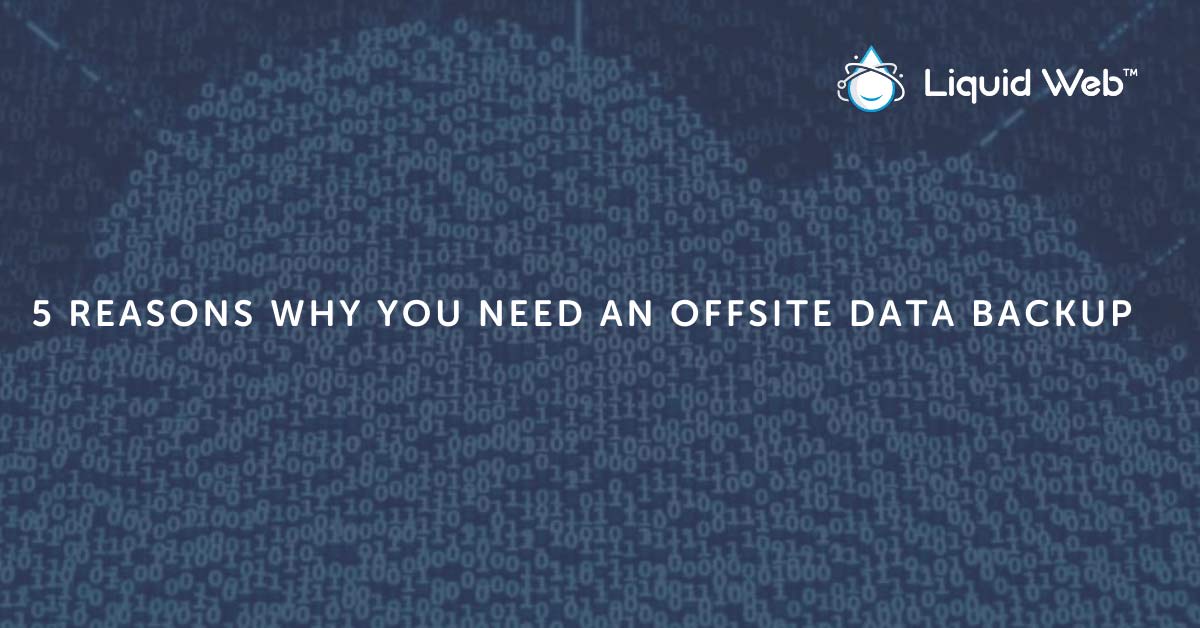
Trying to find out what offsite backups are and how off-server data backups work? Wondering why backup media should be stored offsite in the first place?
We live in an imperfect world where things don’t always go according to plan. More often than not, Murphy’s Law is in effect, and events that could be detrimental to your business or data will happen. It’s no longer a matter of if but when.
Businesses must employ an offsite data backup to protect against breaches and natural catastrophes.
We will explore what offsite backups are, how they work, and how they can help your business continuity flourish.
What are Offsite Backups?
Offsite backups are a means of securing data to a server or media in a different location than the primary server.
Local backups stored on hard drives or media on the originating server provide a sense of security in case small issues occur. If a single file becomes corrupted, backups stored on the server can quickly retrieve those files and restore them. Offsite backups provide a similar sense of security but on a much larger scale.
To understand the concept, think about your home computer.
Anything stored on your computer would be local to your machine. If something happens to your computer’s storage drive, that data is lost. An external drive solves for this, in theory, because a copy of your information exists in a location other than directly on your computer. While it is not genuinely offsite from your home, it illustrates the point of how crucial offsite backups are to keeping your data safe.
How Do Offsite Backups Work?
There are several ways to implement offsite backups. Typically, there is software used to sync data or take a snapshot of it for backup, also called a full backup. The data is then encrypted for transit and often compressed before being transmitted to the designated secure location for storage.
There are also solutions that offer the ability to have your information incrementally backed up by saving only the changes to your file system. Providing this type of service allows for multiple recovery restore points.
Most hosting providers, like Liquid Web, handle management and support while offering you an easy way to manage your backups.

For those wondering — “Why should backup media be stored offsite?” — here are the top five reasons:
1. Primary Storage Space Preservation and Performance Optimization
Whether your infrastructure is at your place of business or with a hosting provider, primary space can be limited for those who have a single storage volume and no backup drive. The need to preserve space is essential, no matter how you plan to host your projects.
For those already hosting everything with a managed provider, offsite backups can still save primary drive storage space while keeping your server running optimally. Leaving your primary storage for your operating system and critical files allows everything to run a bit smoother without having to dedicate some of that space for backups.
Removing the backups from your primary drives is also cost-saving for you. Instead of having to upgrade your array quickly, you can keep what is needed to operate, especially if that data does not change much.
2. Protection From an Onsite Location Disaster
For those hosting their infrastructure at their place of business, there is always the chance that some kind of unforeseen natural disaster could happen, such as a fire, flood, tornado, earthquake, or hurricane. Preparing for these eventualities is paramount for data protection. Therefore, it is worthwhile to have your critical infrastructure onsite with backups stored in a separate, secure, and accessible facility.
Moving backups offsite also presents savings in terms of physical space in your place of business.
If you are not able to set up infrastructure in another location due to budget or lack of space, a managed hosting provider would be the next best option. This is another reason why backup media should be stored offsite.
While there is an added cost for having offsite backups, the peace of mind knowing you can restore your server in a crisis is worth it to your business.
3. Defense Against a Complete System Crash
One of the primary reasons why backup media should be stored offsite is to protect against a complete crash of your system. In a perfect world, your server would always be reachable and would never experience system software, web server, or database server failures. In reality, these things do happen, and having the proper safeguards in place can save you time, money, and even your business.
We covered this very topic in another article on Data Backup and Disaster Recovery. Offsite backups would be an integral part of your business continuity plan that helps your business avoid data loss. If your server were to crash, your disaster recovery plan stands ready for you to recover or restore your vital information and continue to function.
How can a system crash affect you as a consumer or business owner? You can ask motorists from the Missoula County Office of the Treasurer in the state of Montana. The office was unable to process requests for drivers on Monday, July 1, 2019, due to system issues. When they returned on Tuesday, they were greeted with long lines and even longer wait times.
4. Assurance in the Event of Hard Drive Failure
System crashes are not the only threat to data integrity. Hardware failure, more specifically hard drive failure, can also result in loss of data and costly downtime. Hard drives have a finite life span and do not last forever. While drives with internal moving parts can fail much faster than drives with flash memory, there is still a definite number of reads and writes for those drives during their lifespan. Having offsite data backups mitigates against hard drive failure.
While data retrieval from a failed drive is sometimes a possibility, the time involved in doing so, as well as the usual high costs involved, do not always make this practical for your business. Data retrieval from failed drives can be shipped to companies specializing in data recovery, which is generally complex and costly, and most IT personnel do not have the skills to achieve data recovery.
Perhaps the most significant issue with this occurrence would be the amount of downtime involved.
According to Gartner, businesses typically cite $5,600 per minute lost due to network downtime.”
The loss of revenue far outweighs the cost of ensuring you have proper backups for disaster recovery.
Large companies with tons of data center space are not immune to downtime. Facebook, Instagram, and WhatsApp have experienced three separate outages in 2019 alone. Every second that users are not logged in and interacting with their platform causes severe losses in advertiser dollars.

5. Recourse in the Event of Data Breach
A data breach happens when an unauthorized party gains access to sensitive or private data. Data breaches have become commonplace in this day and age. It has almost become impossible to read or hear the news without there being a report of a data breach of some sort.
Whether it is malware, software vulnerabilities via out-of-date software or exploitable websites, or weak passwords, data security and backups have become increasingly imperative. Having offsite backups gives you the ability to start fresh with a clean, uninfected copy of your data to either restore or look for possible attack vectors to clean up on your current server.
Some hosting companies, such as Liquid Web, keep their offsite backups inaccessible by the server, keeping them safe from harm should the server be breached. In addition, the backup is encrypted to further protect against unauthorized access and scanned for infections before being stored for additional security.
No doubt, having an offsite solution in place would be advantageous for the Georgia Court System. Hackers knocked their entire system offline with the use of ransomware. In addition to losing access to networks, the hackers held several state court systems hostage for ransom.
Offsite Backups With Liquid Web’s Acronis Cyber Backups
With two convenient and secure storage types, including Liquid Web Cloud storage or Acronis Backup Cloud storage, Acronis provides an easy-to-use self-service portal and offers encryption as an option for your cloud backups.
It has several different methods of backing up data, including incremental, differential, and full backups, making it easy to customize your recovery plan to your unique business needs.
All of this ensures that you can restore your server data in case of a disaster. All backups are stored in a different data center from the server; a true off-server and offsite backup solution.
What are the Features of Acronis Cyber Backup?
Acronis is packed full of cutting edge features:
- Off-server and offsite backup storage.
- Full backup encryption is available.
- Ransomware and malware protection for your stored backups.
- At least 2x faster recovery than other solutions.
- Near zero impact on server resources.
- Shortest backup window possible.
You Need an Offsite Backup
Offsite backups serve to protect us from the imperfections of the world around us. They help us in preserving our physical and technical storage space, give us protection against a complete system crash or hardware failure, and help us regain our data in the event of a breach.
No matter which of these you are solving for, the right offsite backup solution is worth your peace of mind.
[ad_2]
Source link


![Offsite Backup [Top 5 Reasons for Data Security]](https://dealzclick.com/wp-content/uploads/2022/02/Elden-Ring-Horizon-Forbidden-West-Sifu-and-More-February-Games.jpg)
![Offsite Backup [Top 5 Reasons for Data Security]](https://dealzclick.com/wp-content/uploads/2022/02/Heal-Your-Dog-Naturally.jpg)



